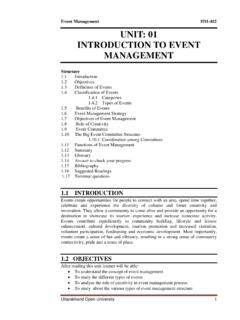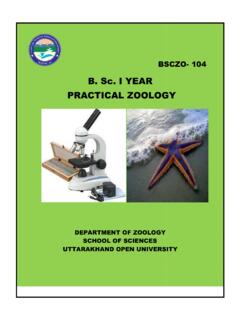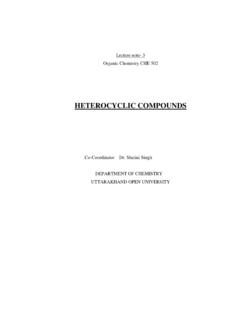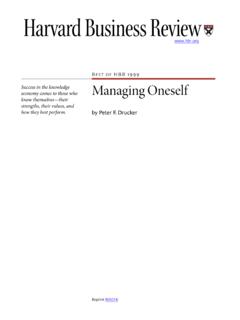Transcription of Principles of Management HM 104 UNIT 1: EVOLUTION OF …
1 Principles of Management HM 104 Uttarakhand Open University 1 UNIT 1: EVOLUTION OF THE PROCESS OF Management AND ITS PRESENT STATUS STRUCTURE Introduction Objectives Management : Concept and Meaning Different Definitions of Management Characteristics of Management Need of Management Meaning of Management Process Management Process defined Functions/Elements of Management Importance of Management Management in the Future Development of Management Thought Historical Background of Management EVOLUTION of Management Thought Contribution of F.
2 W. Taylor to Management Thought Contribution of Henry Fayol to Management Thought Contribution of Elton Mayo to the Development of Management Thought Systems Approach to Management Thought Contingency Management School / Contingency Approach to Management / Situational Approach Summary Glossary References/Suggested Readings Question Bank INTRODUCTION The concept of Management has acquired special significance in the present competitive and complex business world. Efficient and purposeful Management is absolutely essential for the survival of a business unit.
3 Management concept is comprehensive and covers all aspects of business. In simple words, Management means utilising available resources in the best possible manner and also for achieving well defined objectives. It is a distinct and dynamic process involving use of different resources for achieving well defined objectives. The resources are: men, money, materials, machines, methods and markets. These are the six basic inputs in Management process (six M's of Principles of Management HM 104 Uttarakhand Open University 2 Management ) and the output is in the form of achievement of objectives.
4 It is the end result of inputs and is available through efficient Management process. OBJECTIVES To understand the concept of Management To understand the need and importance of Management functions To understand the concept of Management process and its development To understand the Management of the future Management : CONCEPT AND MEANING Management is the act of getting people together to accomplish desired goals and objectives using available resources efficiently and effectively. Management comprises planning, organizing, staffing, leading, coordinating and controlling an organization (a group of one or more people or entities) or effort for the purpose of accomplishing a goal.
5 Resourcing encompasses the development and manipulation of human resources, financial resources, technological resources and natural resources. Since organizations can be viewed as systems, Management can also be defined as human action, including design, to facilitate the production of useful outcomes from a system. This view opens the opportunity to 'manage' oneself, a pre-requisite to attempting to manage others. The term ' Management ' is used extensively in business. It is the core or life giving element in business. We expect that a business unit should be managed efficiently.
6 This is precisely what is done in Management . Management is essential for the conduct of business activity in an orderly manner. It is a vital function concerned with all aspects of working of an enterprise. DEFINITIONS OF Management 1. According to George R. Terry, " Management is a distinct process consisting of planning, organising, actuating and controlling, performed to determine and accomplish stated objectives by the use of human beings and other resources". 2. According to Henry Fayol, "To manage is to forecast and to plan, to organise, to command, to coordinate and to control".
7 3. According to peter drucker , " Management is a multi-purpose organ that manages business and manages managers and manages workers and work". 4. According to Harold Koontz, " Management is the art of getting things done through and with people in formally organized groups . 5. According to Mary Parker Fallett, " Management is the art of getting things done through people". Principles of Management HM 104 Uttarakhand Open University 3 CHARACTERISTICS OF Management 1.
8 Management is a managerial process: Management is a process and not merely a body of individuals. Those who perform this process are called managers. The managers exercise leadership by assuming authority and direct others to act within the organisation. Management process involves planning, organising, directing and unifying human efforts for the accomplishment of given tasks. 2. Management is a social process- Management takes place through people. The importance of human factor in Management cannot be ignored. A manager's job is to get the things done with the support and cooperation of subordinates.
9 It is this human element which gives Management its special character. 3. Management is action-based: Management is always for achieving certain objectives in terms of sales, profit, etc. It is a result-oriented concept and not merely an abstract philosophy. It gives importance to concrete performance through suitable actions. It is an action based activity. 4. Management involves achieving results through the efforts of others: Management is the art of getting the things done through others. Managers are expected to guide and motivate subordinates and get the expected performance from them.
10 Management acts as an activating factor. 5. Management is a group activity: Management is not an isolated individual activity but it is a collective activity or an activity of a group. It aims at using group efforts for achieving objectives. Managers manage the groups and coordinate the activities of groups functioning in an organisation. 6. Management is intangible: Management is not directly visible but its presence is noticed in the form of concrete results. Management is intangible. It is like invisible spirit, which guides and motivates people working in a business unit.










